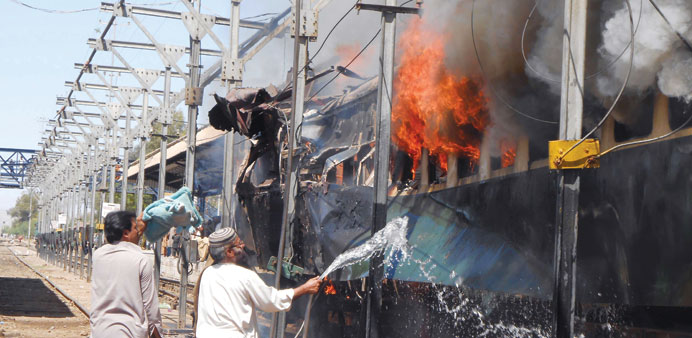AFP/Islamabad
A bomb blast on a train in Pakistan’s restive southwestern province of Baluchistan killed at least 13 people and injured 40 others yesterday, officials said, with the death toll feared to rise.
The United Baluch Army (UBA), one of several armed separatist groups in Baluchistan, claimed responsibility for the bombing, with its spokesman warning of more such attacks in the coming days in response to a major military operation against militants that began on Monday.
The explosion occurred after the train had pulled to a stop and passengers were disembarking at Sibi railway station around 160km south of its destination Quetta, the provincial capital.
Two carriages quickly became engulfed by a scorching inferno and smoke as passengers, some of whom were on fire, screamed and struggled to escape, senior police official Mohamed Nazar, who was at the scene, told AFP.
“We have recovered 12 dead bodies from the train. They have been burnt to charcoal,” he said, adding one of the injured had died after being taken to a military hospital in the same town.
Sher Khan Bazai, a senior administration official, confirmed the incident.
“24 patients are in critical condition, they will be shifted to Quetta as soon as they are stable enough to travel,” he said, adding that the injured included six women and four children.
The flames were only put out after fire fighters reached the scene, Nazar told AFP.
“I can’t say whether the dead are adults or children as they are beyond recognition,” he said.
The Frontier Corps (FC) began an operation against insurgents early Monday in the Kalat district, around 300km southwest of Quetta.
They said they had killed 40 insurgents belonging to the Baluch Republican Army (BRA) and Baluch Liberation Army (BLA) though the toll could not be independently verified.
“Today’s attack was a revenge against the military operation,” said UBA spokesman Mureed Baluch. “We warn the people not to travel in trains as we will continue attacks in the future,” he added.
The train, known as the Jaffar Express, is a daily express service covering a 1,460-km journey from the garrison city of Rawalpindi in the Punjab province to Quetta.
Bazai, the administration official, said the two affected bogies had been disconnected and the train resumed its journey.
Railways Minister Khawaja Saad Rafique said the same service had been attacked a few days earlier, but there were no casualties.
“A few days ago terrorists fired upon a train when it came out of a tunnel (in Baluchistan), but they ran away when security forces responded to firing.
“The train was standing at Sibi railway station where FC and other law enforcement agencies are always alert. We will have to review the security and find out the cracks from where the terrorists slipped in and planted the explosives,” he added.
Baluchistan is home to a long-running separatist conflict that was revived in 2004, with nationalists seeking to stop what they see as the exploitation of the region’s natural resources and alleged rights abuses.
The idea of giving greater autonomy to the province, the size of Italy but with only 9mn inhabitants, is highly sensitive in a country still scarred by the independence in 1971 of its eastern portion, now Bangladesh.
Baluchistan, spread over an unforgiving landscape of mountains and deserts abutting Iran and Afghanistan, is rich in gas and mineral deposits — adding a financial dimension to the battle.
In recent years many people suspected of links to separatist groups have mysteriously disappeared, allegedly at the hands of the intelligence agencies.

A Pakistani railway official extinguishes fire after a bomb blast on a train at the Sibi railway station some 160km south of its destination Quetta ye
